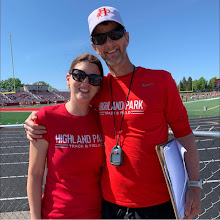Too bad we all couldn't write race reports like that. Phrases like "But motivation rarely stands up to pain" and "Not because I could stand the pain better than the other two, but because I couldn't" and "I was beyond catching because I was beyond pain" might be a overly romantic, but what runner doesn't dream about staring pain in the face and coming out on top?The Eastern Two-Mile Championship for fifty-and-over held on Cape May was no different from an other two-mile race I have ever run. The first mile was smooth and rhythmic, the second a painful agonzing effort to maintain the pace of the first mile.
I had run the first mile in 5:28, cruising along in the steady wake of New Zealander Bob Harmon, and both of us about fifty yards astern of Browning Ross, onetime king of the forty-and-overs, now in his first over-fifty race. But as we turned for home I began to feel the heaviness in the legs, the aching muscles and the breathing getting difficult.
And then as Harmon made his move to pull up on Ross, I was faced with the choice. Accept the challenge and maintain contact, or settle for a respectable third place. It was the moment that decided the race.
Some say races are decided beforehand. Depends on the runner's motivation. If so, I would be a loser. Prior to the start, I had conceded to Ross and Harmon and was hoping to beat the rest of the twenty-five-man field. But motivation, it seems to me, rarely stands up to pain. No matter how determined you are, that determination is conceived in a pain-free atmosphere. It has no relation to the real world that comes into being shortly after starting the second mile.
Still, if motivation enhances performance, task aversion, the psychological response to the discomforts of lactic-acid accumulation, the anticipation of future agonies certainly diminishes it. Where motivation paints the future in unnaturally rosy hues, task aversion pictures it in somber grays and funeral blacks.
Task aversion is not new. Even the God-man asked that the cup might pass. We all have the tendency to give up. Army physiologist R. A. Kinsman reported that subjects working on a bicycle ergometer at fifty-six percent of aerobic capacity had quitting time ranging from one-and-a-half to ninety-eight minutes.
When Harmon made his move, I was battling all three elements of fatigue: motivation, lactic acid and task aversion. If I went with Harmon, if I maintained contact, it would mean the escalation of effort in trying to catch the supposedly unbeatable Ross, and, even worse, the possibility of actually catching up to him and then having to sprint, God knows how, to the finish. What that would mean to my already suffering body was too cruel to contemplate.
But, cruel or not, I chose the race. And, having made the decision, concentrated on Harmon's shoes. And while I sat in behind him, using his draft, focusing my attention on his feet, narrowing the whole world to just him and me, we reached Ross and passed him.Now the pain and tension and the apprehension became unbearable. My great desire was not so much to slow down as to sprint. To sprint and get it over with, no matter how painful it might be.
And that was the way it was. With almost a full quarter to go, I took off. Not because I could stand the pain better than the other two, but because I couldn't. And because I wanted to control my own fate. Set my own pace and not accept theirs.
This much-too-early move took them by surprise and they waited, and that was fatal. By the time they came back at me, I was beyond catching because I was beyond pain.
I was moving in a sea of lactic acid, lifting legs that no longer understood what made them move. My breathing came in short, inadequate gasps, but my body no longer cared. I had broken through a barrier just as surely as I broke through the tape at the finish.
Fatigue, you see, does depend on motivation and lactic acid and task aversion, but it also depends on something else. Man's limits are not simply in his cells or even in his brain. You can measure lactic acid and stimulate brain areas with an electrode and make a person's arms and legs move. But there is no place in the brain where stimulation will cause a person to decide. No substance in his blood that cause him to believe.
That choice, that act of faith, is made in the mind. And in answering the great question. "Will you or won't you have it so?" we find the energy that conquers fatigue and conquers ourselves as well.
Sunday, June 07, 2009
CONTROL MY OWN FATE
I've mentioned that I've been re-reading Dr. George Sheehan lately. As I was approaching the finish line this morning, I was thinking about this passage from Running & Being.
Subscribe to:
Post Comments (Atom)

2 comments:
Great, great clip, just in time for Grandma's. In my short, recent racing career, I've quickly found if I don't ponder the race in terms similar to Sheehan's (but not nearly as eloquent), I find myself unprepared for the challenge the pain will present in a race. Reading and thinking about this will help me be ready to accept the pain and push on when it happens in the half on the 20th.
How was Grand Old Day today?
Brian, Grand Old Day went pretty well. You can see my race report below this one. It was about 50 degrees, misty and a second half headwind. I'm at the end of marathon training and I ran 16 miles the day before. Given all that I was still able to run faster than at Human Race.
Post a Comment